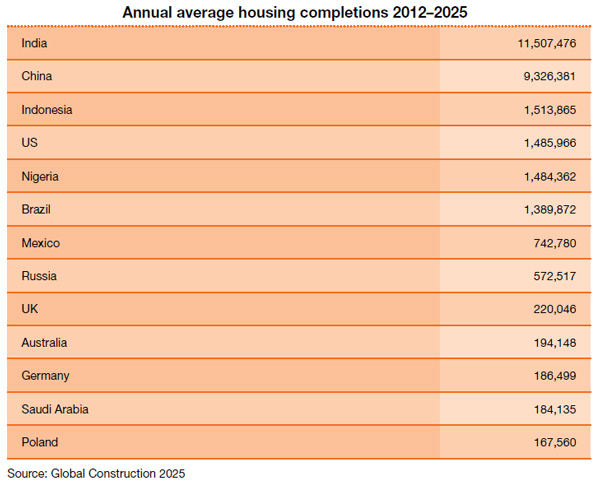It seems like every second day a new real estate development springs up across various Indian cities, which is a good thing since the sector is a large contributor to India’s economic growth.
And it doesn’t look like the skyline is going to be clear of cranes any time soon, if Pricewaterhouse Coopers is to be believed. In a report titled ‘Real Estate 2020: Building the future’, the research house states that by 2025 over 60 percent of the global construction activities will be taking place in emerging markets like India, Indonesia and Mexico.
The construction activity in developed markets is going to pale in comparison to that in developing markets. The total number of completed houses in theUK and Australia(a little over 414,000) will still fall short of the nearest emerging market, Russia, by over 150,000, the report states.
Of the top 10 countries leading the average house completion projections for the period between 2012-2025, seven can be classified as developing or emerging markets, with the US, UK and Australia representing developed markets in the group.
India leads the pack with over 11.5 million complete houses, followed by China (9.3 million) and Indonesia (1.5 million). The US (1.485 million) at #4 is only marginally ahead of Nigeria (1.484 million).
The moot question here is whether the higher supply of houses will bring down the overheated prices in India.
Very unlikely, given the investor interest in the sector. According to a Preqinsurvey quoted by PwC, over 54 percent of sovereign wealth funds have investments in real estate, with a majority coming from the Middle East, Africa and Asia. And as observed in the past, investor interest always leads to speculation and higher prices.
According to PWC calculation, the surge in high-net-worth individuals (HNWI) in emerging markets will result in 76 percent of real estate projects being funded by the ultra rich by 2020.
“Private capital will step in to fill the gap left by banks and insurers as a result of regulations that require reduction in their exposure to real assets,” the report said.
Studies too have shows that institutional investors are raising allocations to real assets.
In a survey of institutional investors managing $1.9 trillion, 72% said they would be more likely to invest in real estate than any other asset class in 2013.
)